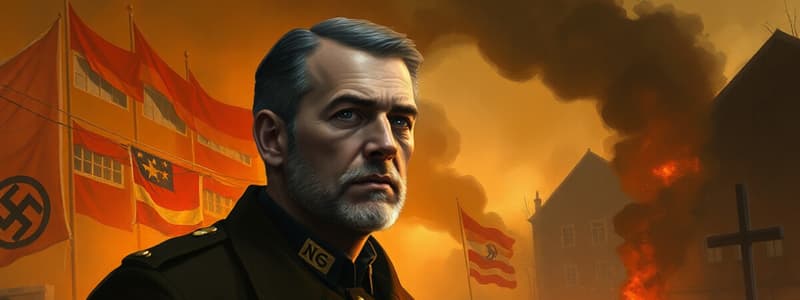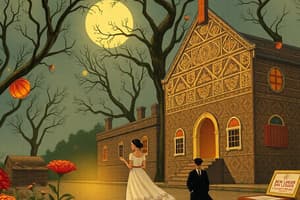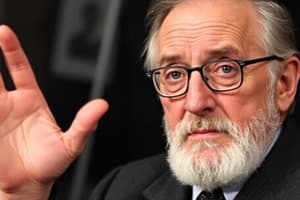Podcast
Questions and Answers
Ben Lesser witnessed a Nazi soldier murdering a baby in his neighbor's apartment. How did this event affect his understanding of the Nazi regime's broader goals and tactics?
Ben Lesser witnessed a Nazi soldier murdering a baby in his neighbor's apartment. How did this event affect his understanding of the Nazi regime's broader goals and tactics?
This event exposed the nazis' ruthlessness, terror, and disregard for human life and showed that children were not exempt from their brutality.
Lesser's family had several opportunities to escape death, often with the help of non-family members. How did these experiences shape his understanding of human nature and the role of altruism during times of crisis?
Lesser's family had several opportunities to escape death, often with the help of non-family members. How did these experiences shape his understanding of human nature and the role of altruism during times of crisis?
These experiences taught him that even in the darkest of times, there are individuals who are willing to risk their lives to help others, reinforcing his belief in the importance of human kindness and compassion.
While in the concentration camp, Ben lied about his age to appear older and stronger. How did this act of deception influence his survival and what does it illustrate about the moral complexities faced by individuals in extreme situations?
While in the concentration camp, Ben lied about his age to appear older and stronger. How did this act of deception influence his survival and what does it illustrate about the moral complexities faced by individuals in extreme situations?
This act of deception allowed him to be selected for work, increasing his chances of survival. It demonstrates the difficult choices people make when faced with life-or-death circumstances.
After liberation, a priest encouraged Ben to remain proud of his religion. How did this encounter alter his perception of Gentiles and contribute to his understanding of shared humanity?
After liberation, a priest encouraged Ben to remain proud of his religion. How did this encounter alter his perception of Gentiles and contribute to his understanding of shared humanity?
Ben Lesser's experience includes surviving a death march and a death train. In what ways did these experiences challenge his physical and emotional limits, and how did he manage to endure such extreme conditions?
Ben Lesser's experience includes surviving a death march and a death train. In what ways did these experiences challenge his physical and emotional limits, and how did he manage to endure such extreme conditions?
Flashcards
The Holocaust
The Holocaust
State-sponsored genocide led by Nazi Germany, resulting in the deaths of millions of Jews and others.
Anti-Semitism
Anti-Semitism
Prejudice, discrimination, or hostility directed against Jews.
Auschwitz-Birkenau
Auschwitz-Birkenau
The largest of the Nazi concentration camp complexes, where over 1 million people were murdered.
DDT
DDT
Signup and view all the flashcards
Death Marches
Death Marches
Signup and view all the flashcards
Study Notes
- Ben Lesser was born in 1928 in Krakow, Poland.
- Before World War II, Lesser spent summers with his mother's family in present-day Hungary.
- His father owned a successful chocolate factory and a wine and fruit syrup factory.
- Lesser's father manufactured animal-shaped chocolate wafer cookies similar to KitKats.
- Lesser's mother was named Shi Seagal.
- Lesser recalls waiting for his father to come home from the factory to get sweets.
- Lesser lived in relative safety until Nazi tanks entered the town, marking horrifying events known as the Holocaust.
- As of 2024, Ben Lesser is 95 years old.
- Lesser survived Auschwitz, a death march, and a death train from Buchenwald to Dachau.
Historical Context of the Holocaust
- The Holocaust was a state-sponsored genocide that led to the deaths of millions of Jews and others.
- Adolf Hitler's rule over Nazi Germany followed a long history of anti-Semitism.
- Anti-Semitism dates back to the 1870s, with reports of anti-Jewish sentiments existing since the ancient world.
- In the ancient world Roman authorities destroyed the Jewish temple in Jerusalem.
- Governmental leaders like Napoleon Bonaparte ended long-standing restrictions on Jews during the Enlightenment.
- Racial and religiously motivated anti-Semitism existed for centuries before the Holocaust.
- When Ben Lesser was 13, he hid during a raid in the Bochnia ghetto.
- During the raid he heard machine guns, screams, and dogs attacking people.
- Lesser survived but his parents did not.
- Many Germans accepted the regime's premise of isolating German Jews.
- Most Germans had a vague idea of the Holocaust's goals, but very few understood the full extent of the "Final Solution".
- Intimidation was used to enforce Nazi social and cultural norms.
- Germans who were friendly towards Jewish people faced harassment by the Nazis.
- Discontent with the existing social order and charismatic Nazi leadership contributed to the German people being complicit in the Nazi regime.
- Hitler and the Nazis began their anti-Semitic campaign gradually, starting with burning Jewish books and synagogues.
- The world remained largely silent during these actions.
- Jews suffered the atrocities of the Holocaust and the silence of the world.
- Had more world leaders objected strongly at the time, many of the 6 million Jews murdered may have survived.
- Ben remembers tanks and soldiers in Poland after the Nazis reached his hometown.
- Many Germans did not agree with the Nazi belief that Jews were a source of racial pollution.
- People still participated in Jewish persecution.
- People excluded Jews from sports teams, book groups, and other social groups.
- Teenagers in schools and universities harassed their Jewish classmates.
- Germans acquired Jewish-owned businesses, homes, and belongings at bargain prices.
- Many people passively accepted the exclusion of Jews in the workplace, socially, at schools, and in communities.
Lesser's Experiences During the Holocaust
- When the Nazis invaded Poland, they pistol-whipped Lesser and his family and ransacked their home.
- A Nazi killed a neighbor's baby by slamming its head into a door frame.
- Curfews were set for the Jews, and resources became very strained.
- Most Jews in Poland were displaced to the Krakow ghetto.
- Ben and his family left the city after the Nazis stated that Jews had to move out of Krakow or into the ghetto.
- 15,000 Jews were packed into an area previously inhabited by just 3,000 people.
- A man who was engaged to Ben's sister helped the Lesser family leave town, avoiding death in the Krakow ghetto.
- Nazis ordered Ben's family to surrender their Jewish books, and Ben's father had hidden all their money in one of the books.
- The family arrived in Nomit with no money.
- Ben's father made money for the family by making pretzels and selling them in the community.
- In 1943, the family learned of an upcoming Nazi pogrom and arranged transportation in a coal truck to Bochnia.
- A man again arranged an apartment for them in the Bochnia ghetto.
- The same night that the Lessers left Nomit, those in the Jewish residences discovered by the Nazis were murdered.
- Ben avoided death once again.
- In Bochnia, Ben, his brother, and his parents moved into a single room with eight strangers.
- The men did manual labor like digging ditches to receive barely edible rations from the Nazis.
- The Lessers and their roommates slept on blankets thrown over straw on the floor.
- They hid behind a large armoire with a secret back panel while Nazi soldiers searched the buildings.
- Corpses and body parts littered the streets after the raid.
- Instead of burying their neighbors, they had to pile the bodies up before the Nazis set them on fire.
- The Lessers moved into an apartment outside of the Bochnia ghetto with Hungarian citizenship cards.
- Someone arranged a plan for the family to escape to Hungary by bribing a coal truck driver.
- Ben hugged his parents goodbye knowing that he might never see his parents again, which he never did.
- Lesser hid under the chassis of a coal truck with his brother to escape.
- Nazi soldiers were hitchhiking on top of the truck without knowing about Lesser and the others.
- Ben and his brother were reunited with their uncle in Monot.
- They learned that their parents and older brother had died after someone called the Gestapo.
- In 1944, the Nazis invaded Hungary.
- At age 15, Ben and two of his siblings were sent to Auschwitz-Birkenau.
- Ben and 80 others were subjected to inhumane conditions during a 3-day transport, including being cramped, having no food or water, and overflowing sanitary facilities.
- Ben, his uncle, and cousin were sent to the right to work, while his aunt, sister Goldie, and brother Tuli were sent to the left to be killed.
- Lesser never saw them again.
- Ben realized they had sent his siblings to gas chambers when a guard explained that the ash falling from the sky was made up of the bodies of loved ones.
- Ben told the doctor, Joseph Mengele ("the angel of death"), that he was 18 and healthy, despite being 15 and a half.
- Ben's hair was cut, sprayed with DDT, obtained striped clothes and wooden clogs, and was given a wooden disc inscribed with the number 41212.
- Murders carried out through mass shootings and poison gas.
- Others died from starvation, abuse, exhaustion, and deadly medical experiments.
- Food included bread made of sawdust and fake coffee, sometimes containing rats or leather.
- Ben was made to work in forced labor conditions that led to many deaths due to abuse and exhaustion.
- Starvation was widespread and constant.
- Ben was also eaten up by bed bugs, but says all he had was hope.
- He remembers murderous dogs, whips, screams, mountains of skeletal corpses, lice, vermin, standing in freezing cold, roll calls.
- The Nazis made prisoners dump tons of human ashes and incinerate bodies in fire pits, and crematoriums could not keep up.
- Three inmates escaped at the labor camp.
- The remaining prisoners were punished harshly.
- After a long day of work, the inmates were made to line up in rows of five and were counted and recounted.
- Ben realized his uncle would be the 10th person in line and switched places with him.
- Men were beaten while standing close to a sawhorse, and had to count out loud while being beaten they miscounted.
- Three men were beaten mercilessly before Ben.
- Ben felt like he had some kind of self-hypnosis that allowed his mind to leave his body and made it through.
- The inmates caught the escpaees and strung them up 30 minutes after the beatings
- Ben and his cousin Isaac were sent on a 3-week-long death march to Buchenwald.
- Prisoners who could not keep up with the march were shot.
- They had no warm clothes or shoes and were rarely fed, and countless men died from gunshot wounds, starvation, exposure, disease, and exhaustion.
- Some Nazi guards passed the time with target practice on those who were dying.
- Ben got bread and soup in Buchenwald, was allowed to shower, and received clean clothes.
- Ben was soon sent on a death train from Buchenwald to Dachau.
- Ben was one of the 18 people who survived the 3,000 that were originally on the train.
- In March 1945, Ben and his cousin Isaac were transported in dirty cattle cars with many other prisoners.
- Ben had to lead his weaker cousin to the back end of the car so they could support each other.
- Ben was stabbed in the chin getting bread, creating a gaping hole.
- There was no more food for the rest of the brutal 4 week long trip.
- Water was refilled only occasionally.
- They survived each day with a tactical rationing of the bread they ate.
- The people who had eaten two or three loaves of bread at the start were so dehydrated they died.
- Others died of starvation or were killed by cannibalism.
- Ben's chin wound did not get infected.
Liberation and Aftermath
- On April 26th, 1945, Isaac and Ben arrived at the Dachau concentration camp.
- The only reason they were not immediately incinerated was due to a coal shortage.
- Three days after arriving at Dachau, Ben was freed when Americans liberated the camp.
- He was considered a displaced person without a family or a home.
- Ben remembers people kissing the boots of the American GIs.
- Only Ben and his older sister Lola survived the Holocaust out of his family of seven.
- When Ben survived the Dachau liberation, he collapsed into a priest's arms.
- A priest told him to remember to be proud of his religion, which changed his view of Gentiles.
- Ben realized that every religious and ethnic group has righteous people and that we share a common humanity.
- When Lesser and the other Jews were liberated, Lesser was about 65 lbs.
- He and his cousin ate a can of spam and came down with dissentary, and his cousin died that night in Ben's arms.
- Ben held Isaac close and spoke softly to him, telling him they were finally free and would have lives again.
- Lesser's sense of identity was the number he was assigned in a concentration camp: 41212.
- Ben woke up from a coma in a monastery in Bavaria, Germany.
- Next to him was another Polish Jew, Moshe Opatovsky, who had also lost his family.
- When Ben learned that his sister had also survived the horrors of the war, he stayed with her in Germany and later migrated with her to the United States.
- Ben stayed at the monastery for several months as he regained his strength.
- He learned they were all orphans, and joined a group of other young Jews.
- Ben and his sister migrated together to the U.S. in 1947.
- He lived briefly in Brooklyn, New York.
- Lesser built a successful real estate career in Los Angeles, California, and retired in 1995.
- Lesser has been devoted to ensuring that all people remember the Holocaust since.
- He currently lives with his wife in Las Vegas.
- Ben Lesser wrote a book about his experiences called "Living a Life That Matters: From Nazi Nightmare to American Dream".
- He was awarded the Order of Merit Cross from the Federal Republic of Germany.
Studying That Suits You
Use AI to generate personalized quizzes and flashcards to suit your learning preferences.




